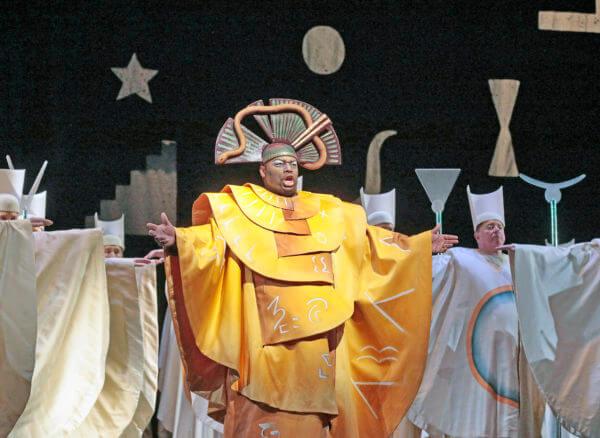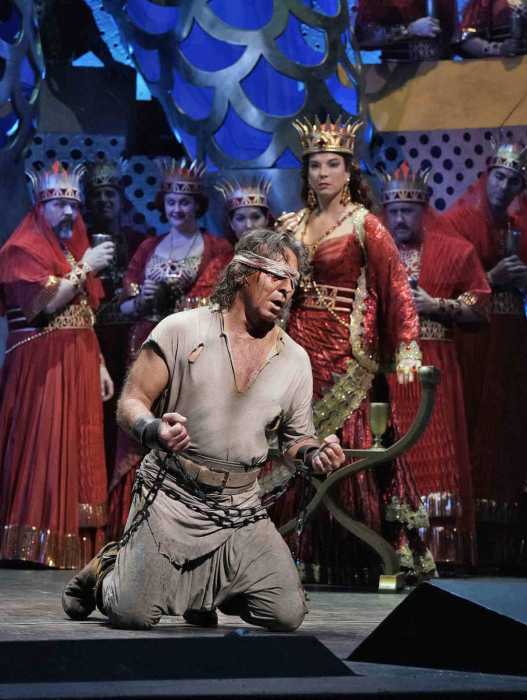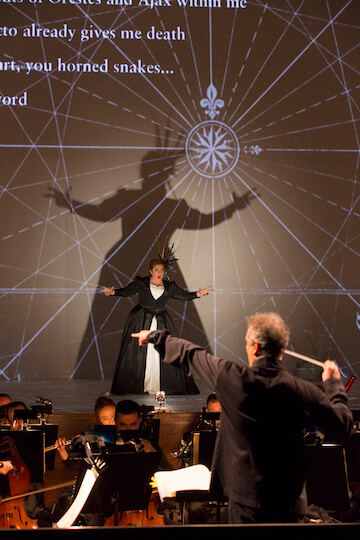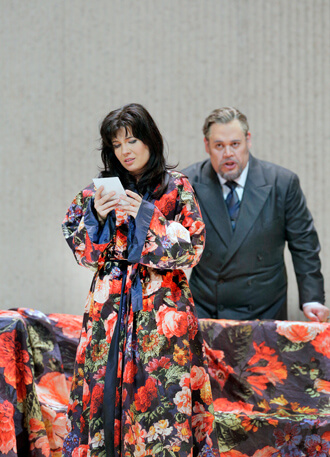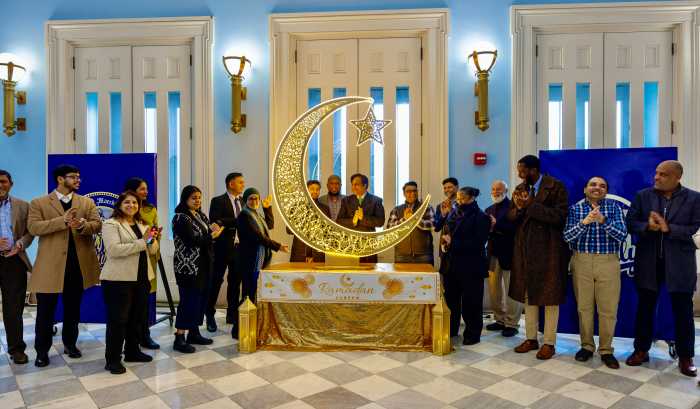Morris Robinson brought force-of-nature sound to Sarastro in Mozart’s “Magic Flute at the Met. | KEN HOWARD/ METROPOLITAN OPERA
BY DAVID SHENGOLD | In principle it was a good idea for the reconstituted NYCO to revive “Candide”: the Bernstein centennial approaches, and there’s life in the 1956 musical yet, as Glimmerglass showed quite handily in 2015. Some attractive names from Broadway as well as opera took part, and at the second show January 7 there were moments to enjoy. I fear the revival foundered on what had been proclaimed the coup, awarding the direction to the aptly legendary Hal Prince. The octogenarian director had supervised two previous Broadway “Candide” productions, including the 1974 reimagining that got the piece back in play. He also did a cartoonish but popular NYCO version back in the Sills era. But the world has changed; the kitschy, cheap laff-garnering “traveling players” concept on view seemed stale and flat.
The energetic ensemble of singers and dancers featured some accomplished artists; Curt Olds, the cover Pangloss, might well have been a better option than Gregg Edelman, who was bland and vocally patchy with lyrics not always comprehensible. An aging jeune premier does not perforce a character actor make. Genuine character actors Chip Zien and Brooks Ashmanskas – in multiple roles – got their laughs, but much of what Prince asked them to do was tired shtick 30 years ago. And so it went: the director and his team seemed to have done no rethinking whatsoever of this difficult piece, made more difficult by Hugh Wheeler’s horrendous book with its multiple rape jokes and witless, clichéd treatment of “fiery” Latin Americans and corrupt Turks.
“Candide” at NYCO, Tchaikovsky at NYFOS, “Magic Flute,” Nabucco” at Met
Charles Prince — the director’s son — led credible players without special flair. Jay Armstrong Johnson made an endearing Candide, though singing in a very contemporary Broadway mix of tremolo and mic-enabled croon that didn’t suit his big moments, the sound enhancement channeling overkill throughout. One had to applaud the energy and pizazz of Linda Lavin, dishing out the schmaltz as the Old Lady yet always reacting to her colleagues. Jessica Tyler Wright returned from NYCO’s 2008 show as an apt Paquette. Hands down, the best singing came from the mercifully unbrassy Cunegonde, Meghan Picerno (not virtuosic in “Glitter and be gay” but legato and supported throughout) and the suave-toned Keith Phares (Maximilian). Not a wasted afternoon, but one wanted to like it so much better.
January 24 at Merkin Hall, the genial pianists Steven Blier and Michael Barrett’s always-heartening New York Festival Of Song offered a splendid program devoted to Tchaikovsky’s songs. Blier gave a typically engaging, thought-provoking biographical context, but unfortunately had been reading David Brown’s almost willfully homophobic Tchaikovsky studies and rehashed the now quite discredited story of the composer’s supposed honor-induced suicide. Brown dealt in Alternative Facts and presented another gay martyrdom that we hardly need as the Era of Pence proceeds.
But the music was salutary, a mix of chestnuts and lesser-known songs, plus one apiece by Tchaikovsky’s teacher Anton Rubinstein (the stunning “Zuleika,” replete with melisma) and his students Anton Arensky and Sergei Taneyev. Ukrainian soprano Antonina Chekhovska took a song or two to warm up, but displayed an impressive, multi-layered voice of considerable range and color. She lingered more over linguistic details than did the Met’s excellent middleweight baritone Alexey Lavrov, though his more operatic delivery certainly impressed on its own terms. More consistent legato would be welcome, but Lavrov is certainly one of the most gifted young artists on the Met roster. It would be great to hear both him and Chekhovska in “Iolanta” soon.
At year-end holiday time, the Met alternates family-friendly programming, each season offering an English language, lower priced option: the sanguinary “Hansel and Gretel” (maybe most suitable for tweens and teenagers) plus condensed versions of “Barber of Seville” and “Magic Flute.” With the Rossini and Mozart, one must steel oneself that whole numbers will vanish — with “Flute,” this year’s pick, that included “Bei Maennern” and “Bald prangt,” two of the score’s highlights – and that others, like “Dies Bildnis,” are cut to one verse, but it’s kind of a relief not to hear every word of the original dialogue, the Priests’ duet and the like. Plus, the “quest” plot and showy Julie Taymor production do hold most of the kids’ visual interest. It’s a worthwhile investment in audience building, and December 29’s matinée under Antony Walker provided much to enjoy.
Caitlin Lynch, as Pamina – in the single performance awarded her all season – proved a triumph lovely and moving, physically, musically, and vocally. Why don’t we hear this outstanding soprano more often? Ben Bliss’ stock is certainly rising with the company; his light, clear voice executed all Tamino’s pitfalls with ease and style if not much impact, though granted, the makeup Tamino wears in this staging renders facial expressions hard to perceive. Morris Robinson’s force-of-nature sound serves Sarastro well, and he’s steadily improved in the part. Ideally, dialog could be a touch slower and grander.
Jessica Pratt (Queen) made all five high F’s but the idiom suits her less than her Rossinian ventures; the music, neither shaped nor acted with dramatic distinction, made her timbre sound rather chalky and ordinary. In contrast, Christopher Maltman’s utilitarian baritone suited Papageno perfectly, and he sang and acted with commendable style and energy. Dísella Lárusdóttir made a charming Papagena, with far more varied verbal expression than most manage. Another bright spot was Noah Baetge’s clarion First Armed Man, The three boys playing the Genies (Daniel Katzman, Misha Grossman, and Dylan Hansen Hamme), understandably a crowd favorite, proved unusually good.
The Met’s “second cast” “Nabucco” December 27 did little credit to the house, though one wouldn’t have known that from the screaming ovations. Lots of Ukrainian speakers in the audience may have helped there. The first soprano ever to make a company debut in the voice-killer role of Abigaille, Tatiana Melnychenko was gutsy and managed to move her large frame around the treacherous set but seemed a provincial throwback, with huge, growly, out-of-control tones that often veered off pitch when not becoming downright screams. James Levine barely looked at her and in general seemed on autopilot.
Zeljko Lucic encountered his usual pitch issues as soon as he opened his mouth; but after intermission sang very creditably and with feeling. The other moving performance was Nancy Fabiola Herrera’s Fenena — not an improvement on the luxury-cast Jamie Barton but a valid interpretation with the strong, beautiful top notes her music needs. Dmitry Belosselskiy, a good bass also from Ukraine, lacks the crucial low tones for Zaccaria plus something of the majestic delivery this indomitable character warrants. Tenor Adam Diegel (Ismaele) and promising young Sava Vemic (High Priest) disclosed truly alarming vibratos. Danielle Talamantes sounded good as the near-invisible Anna.
David Shengold (shengold@yahoo.com) writes about opera for many venues.

